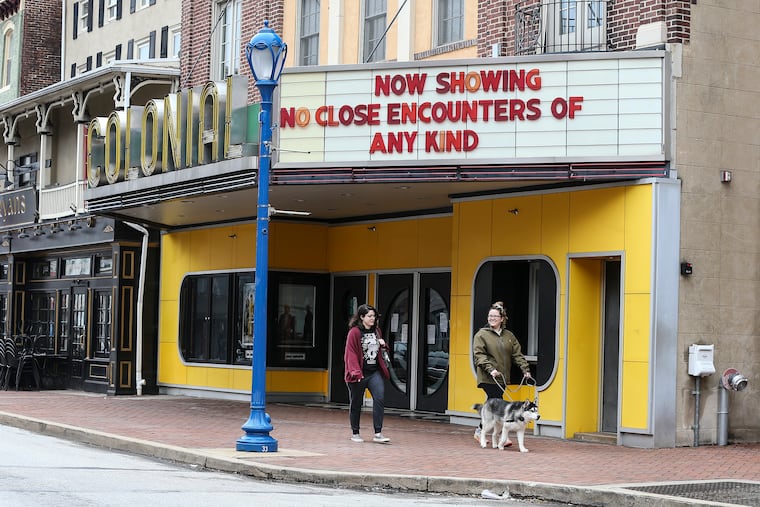‘I hate coronavirus’: A child’s take on Week 1 of isolation as surreal becomes normal | Maria Panaritis
As kids, parents, and everyone else vanish behind four walls, life is becoming stranger than ever.

The boy wrote it on page 3 of a black-and-white composition book that had been brought down from the attic. It was only Week One of our nation’s stay-home sequestration owing to the global pandemic known as COVID-19, but my kindergartner already grasped a key element of this extraordinary moment in history.
“I hate coronavirus," he said in crooked pencil strokes. The journal — my idea — was now passing for classroom instruction since children had been sent home for indefinite at-home confinement to halt the militaristic advance of this disease. “I miss my frineds,” he continued, “and I wonder if my frineds are OK.”
Don’t we all, little buddy. Don’t we all.
To say this first week of no human contact beyond our respective four walls was strange would be an understatement. Most commerce shut down across Pennsylvania, New York, New Jersey, and, as the week wore on, countrywide. Workers were severed from paychecks by the hundreds of thousands.
Suddenly, all of us had been thrust into an alternative universe. One where masked shoppers were abundant, food on market shelves scarce, and optimism low that this odd new reality would be over any time soon.
Our normally frenetic American routines — with all their accompanying anxiety, entitlement, and exhaustion — came to an immediate, disorienting halt. And all because there is no vaccine or substantive treatment for this novel virus that, if allowed to spread unchecked, could overwhelm our hospitals and lead to as many as 1.1 million deaths, according to worst-case projections.
» READ MORE: A sad day as coronavirus forces layoffs at Le Bus. Bakery vows: ‘We intend to survive.’ | Maria Panaritis
Yet, as state and federal elected leaders have taken drastic measures to thwart its further spread, the preemptive cure has left many of us nonetheless stricken.
Surreal. Unfamiliar. Unsettling. Uncertain.
As a fellow journalist from New York told me, this is different from the 9/11 attacks. Then, the bad thing happened and everyone was left shaken. Now, the bad thing is happening — and yet hasn’t happened at all.
On Tuesday, being among the so-called “life-sustaining” professionals that Gov. Tom Wolf has since declared may continue working in Pennsylvania during this pandemic, I drove into far Montgomery County to interview a mother who’d just lost her contract job with a school district. We stood feet away from each other on her family’s front porch.
We didn't shake hands.
Before arriving, I had noticed something unusual for a weekday drive up the Pennsylvania Turnpike. It was full mostly of commercial trucks. Passenger cars seemed palpably scarce.
» READ MORE: Restaurant and contract workers need coronavirus cash, cable bill breaks, mortgage help ASAP | Maria Panaritis
Just off the exit on Forty Foot Road in Lansdale, a sign in front of a Mennonite school caught my eye.
“'FEAR NOT FOR YOU ARE MINE," it said in large block letters slipped into a marquee. "ISAIAH 43:1 PRAYING FOR OUR COMMUNITY.”
On Wednesday, more surreal scenes greeted me on my drive over the Ben Franklin Bridge into Audubon, N.J.
A shopping strip on Black Horse Pike was oddly empty — except for the part with a Walmart.
In South Jersey, where highways and shopping malls are the spine of commerce and the butt of jokes, this was stark.
More of the same when, on the way back to Pennsylvania, I stopped at another suburban Philadelphia shopping mecca: Costco at King of Prussia Mall.
A worker was slathering shopping carts clean with a rag and spray bottle. Only then could you help yourself to one. Inside, customers and workers walked around in protective masks and gloves. Despite the panic shopping that had cleared this place and supermarket shelves over the prior two weeks, it was oddly empty of customers.
In my pocketbook were wipes and hand sanitizer. I refused to touch the checkout keypad. The cashier didn't seem to mind.
Never before have I or any of us — of any age, barring perhaps World War II veterans now in their 90s — lived through what is so suddenly upon us.
Some are calling this akin to wartime. Fair enough. My late father was a World War II orphan — he used to talk obliquely about how wars, in his mind, were a tragic training ground for people to learn how to be humane.
Here we are, then, as a region and a nation: in our great humbling moment. This is where entitlement ends. Let’s hope that humanity rises to the surface — and to the occasion.